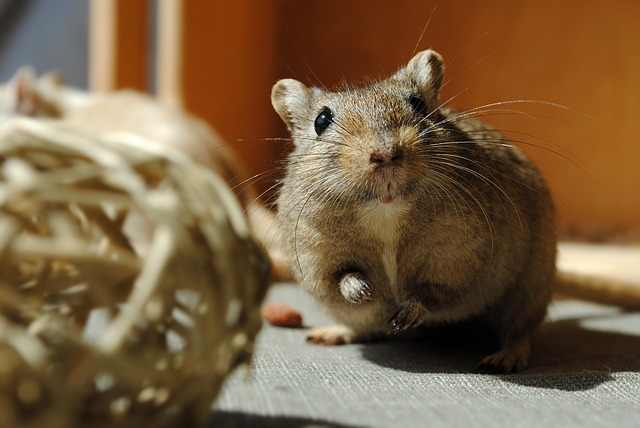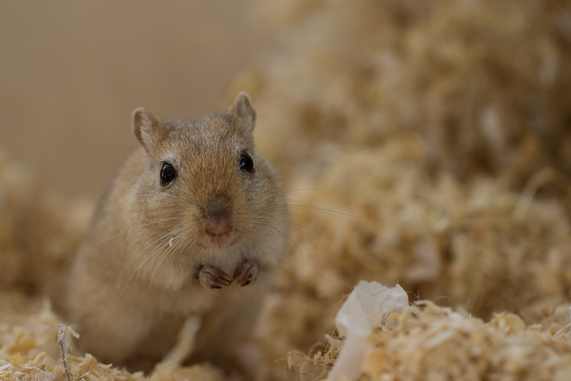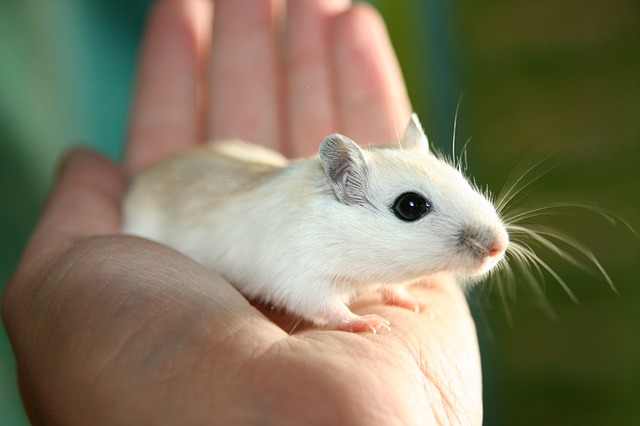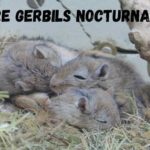Gerbils are calm by nature and do not like noise very much, calls and loud sounds are mostly produced by young animals, during the reproduction period and fights, and in case of danger.
However, studies conducted on wild gerbils in their natural habitat have shown that gerbils have an extremely interesting communication system.
In the wild, you may only spot one or two gerbils at a time, but each one is part of a larger family and group, and their social behavior is a real lifesaver.
Gerbils are prey animals and one of the main reasons they live in groups is because of their anti-predator behavior.
For gerbils anywhere the threat of predators from land and air can be relentless, a single gerbil living alone wouldn’t have the benefit of the others to watch it’s back.
Working as a group the gerbils are much better equipped to outwit their opponents and it’s their anti-predator warning system that helps make this possible.
Gerbils have an amazing warning system based on sounds they make, they can communicate whether it’s an aerial predator, or a predator approaching on the ground and even if it’s a predator that can go into the burrow or not.
Gerbil sounds are not only used to signal danger, but they have a very complicated communication system that is based on multiple sounds, some we can hear and some are on frequencies the human ear can not detect.
There are seven gerbil sounds and each has a different meaning:
- Gerbil purring sounds: mean happiness and approval.
- Gerbil squeaking sounds: mean warning and generally a fight is about to start.
- Gerbil Chirping sounds: mean they want attention and it’s common in pups.
- Gerbil yipping sounds: mean excitement and it usually precedes playtime.
- Gerbil chattering sounds: mean contentment and satisfaction.
- Gerbil clicking sounds: mean in most cases that the gerbil has a respiratory illness.
- Gerbil thumping sounds: mean danger and often associated with pounding both hind legs on the ground.
Table of Contents
Why you need to understand gerbil sounds
Gerbils use sounds to communicate with each other but also to let their pet parents know how they feel and if they like what you do or need to stop.
Being able to understand and differentiate gerbil sounds will help you maintain a better relationship with your gerbils and provide a happy environment for them.
Communication is key to every relationship even with small pets like gerbils, we all like to be able to hold our gerbils and pet them without them feeling anxious or stressed about it, and being able to understand their sounds makes it easier for us to bond with them.
Understanding gerbil sounds is not easy, and for the untrained ear they can sound similar but with a little patience and the following information you’ll be able to interpret each sound and have an idea what your gerbil is feeling and what he’s trying to tell you.
Gerbil squeaking sounds
Gerbil squeaking sounds are often loud and sharp and in most cases destined to each other, squeaking is how they tell each other to back off.
When you hear gerbils squeaking it’s often followed by wrestling and fights, and it’s their way to say no when they are forced into something like being held when they don’t like it.
The gerbil’s squeaking sound is the easiest to detect, it’s the loudest and sharpest of all the gerbil sounds.
It usually is a short but sharp sound and aggressive behavior is exhibited towards other gerbils, sometimes young pups that started to mature.
In the wild young gerbils are sent off to find their territories, so if your gerbils are continuously fighting and squeaking you might need to separate them.
Gerbils also squeak to let their owners know they don’t like something like being petted or held against their will.
In some cases, if a new gerbil is introduced to the group there can be some squeaking if it gets rejected.
Gerbil squeaking sounds are sharp and short sounds often produced when the gerbil is aggressive towards other gerbils or does not want something like being held against it will, it’s the loudest and sharpest of the gerbil sounds and the easiest to understand and often associated with aggressive behavior.
Gerbil purring sounds
Purring sounds in gerbils is a good sign, it can be heard and felt when holding your gerbil, and it means happiness and content.
The gerbil purring sounds are similar to a dog that is feeling comfortable in his owner’s lap, generally, gerbils that like to be held would emit purring sounds as you caress them.
Many gerbil owners mistake the vibrations and purring sounds for fear but it’s not a sign of happiness that can be more felt than heard.
Speaking of fearful vibrations, there are times when gerbils would start vibrating out of fear but it’s usually accompanied by stressed body language and aggressiveness.
Purring sounds are often associated with affection and good company for gerbils, whether it’s other gerbils or their owner.
Gerbil purring sounds are a sign of content and comfort, and it’s often associated with good company, you can feel it more than you can hear it when holding your gerbil and stroking it. Gerbils often emit purring sounds and vibrations when held properly and shown affection.
Gerbil Chirping sounds
Gerbil chirping sounds are often associated with pups asking for attention, it is rare to hear an adult gerbil chirping.
Young baby gerbils are the ones to ask for attention and acknowledgment from their mothers, and it’s nothing to worry about.
If you notice an adult gerbil making chirping sounds then it’s a good time to pick it up and provide some positive attention.
Gerbil chirping sounds can also be a way for some gerbils to ask for food, so you should make sure they’re getting enough food and it’s often a good idea to offer a good treat like mealworms.
Gerbil chirping sounds are sharp sounds often made by young pups to get attention from the mom, it is very rare to notice such behavior in adult gerbils, although some have adopted such chirping sounds to ask for food, treats, and attention from their owners, and it’s generally a good time to hold your gerbil and offer treats.
Gerbil yipping sounds

Gerbil yipping sounds are signs of excitement, it’s their way to show that they want to play and interact.
Yipping sounds might be associated with small jumps to demonstrate interest and excitement and it often precedes playtime.
Yipping sounds are very common in gerbils that bond well with their owners or when they are served treats at the same time every day.
Gerbil yipping sounds and jumps are a good sign that you are doing a great job bonding with your gerbil and you need to make the most of it and never disappoint them by giving them what they want, play sessions or treats holding them, or whatever they’re excited about at that moment.
Gerbil yipping sounds are the sounds they make when they’re excited and want to play or be held, it is often associated with small excitement jumps, these sounds are a good sign that the owner is bonding well with his owner and should fulfill their desire to play to maintain that positive bond.
Gerbil thumping sounds
Gerbil thumping sounds are used as an alarm system to warn the other gerbils of danger, a predator, and is very complicated although to the human ear it may sound the same.
Studies have shown that very specific information about the nature of the approaching danger is communicated with the gerbil thumping sounds.
Gerbils rely on each other to outsmart their opponents in the wild and the thumping sounds are their way of communicating danger.
They can be very descriptive of the nature of the predator, whether it’s an aerial predator, or a predator approaching on the ground, and even if it’s a predator that can go into the burrow or not.
As pets gerbils would make thumping sounds if you make a sudden movement that scares them, if they see a shadow move across the wall (they might think it’s a bird), or if they hear a scary sound( a cough in the night).
Some male gerbils would thump their feet before the mating process, but to gerbils, it’s very easy to distinguish the difference although it sounds the same to us.
In this video you clearly hear the gerbil thumping sound:
Pet gerbils often make thumping sounds, simply because it’ in their nature and it’s nothing to worry about, they are prey animals, and even if you have the most amazing bond with yours they still never going to feel 100% safe and will by instinct start thumping if they feel threatened.
When we say threat it can be something as small and insignificant as a sudden movement a cough or a shadow on a wall.
Gerbil thumping sounds are the gerbil’s way of communicating danger and warning the others about any potential predator, they are very complex even though they sound the same to us, but gerbils can transmit very detailed information about the threat to other neighboring gerbils. Pet gerbils use thumping sounds when they are scared the same way they do in the wild and it’s nothing to worry about.
Gerbil clicking sounds
Gerbils clicking sounds are not really related to mood changes, but it’s more of a noise that the gerbil makes when it’s ill.
Clicking noises are generally related to breathing issues and if it’s loud that you can hear it it’s not a good sign and if you should take your gerbil to see a vet.
Respiratory illnesses are common in gerbils and there can be a lot of reasons for gerbils to get them, sometimes it’s as simple as low-quality dusty bedding.
Clicking sounds are often a result of respiratory infection, so they have a rhythm to them and can easily be detected.
Symptoms of a respiratory infection include a runny nose, which might resemble blood since gerbil mucus is red, sneezing, difficulty breathing, and appetite loss.
Gerbil clicking sounds are often a symptom of a respiratory infection, the clicking sounds are rhythmic because they are a result of breathing difficulty. Gerbils with clicking sounds should be taken to the vet for diagnosis and care and other symptoms would always be associated with it.
Gerbil chattering sounds
Gerbils chattering sounds or chewing-like sounds are a sign of contentment and satisfaction in gerbils and they are a good sign that your gerbil is ready to be held or petted.
When you hear chattering sounds it’s a good time to offer a treat to your gerbil and play with them.
Chattering sounds can be heard after playing activities with other gerbils or the owner.
Gerbils chattering sounds are chewing-like sounds that can be observed in gerbils after playtime with their owner or other gerbils, it’s the gerbil’s way to express contentment and satisfaction and it’s often a good time to gift your gerbil with a good treat.
How to understand gerbil sounds?

Gerbil sounds are their way of expressing their emotions, contentment satisfaction anger, and fear, and they are often associated with other physical gestures that will help you understand them.
The volume of the different sounds is another way to differentiate them, contentment and satisfaction sounds are not very loud on the other hand angry and fearful sounds are the clearest and loudest of the gerbil sounds.
You also need to watch for gestures like jumps and thumps that are associated with the sounds for a complete understanding.
For a better understanding of gerbil vocalizations, you need to listen carefully to your gerbils when interacting and playing to be able to differentiate the different frequencies and body language associated with them.
Gerbils make different noises some are positive and some are negative:
Positive gerbil sounds
Positive sounds are a way for gerbils to express contentment satisfaction and excitement, these sounds are often settle and associated with small jumps and vibrations they are low frequency sounds like :
- Gerbil purring sounds
- Gerbil Chirping sounds
- Gerbil yipping sounds
- Gerbil chattering sounds
Negative gerbil sounds
Negative gerbil sounds are very loud in general and it’s a way to warn other gerbils from danger or to tell another gerbil to back off. Gerbils fight with each other often and they tend to be loud when they do.
- Gerbil clicking sounds
- Gerbil thumping sounds
- Gerbil squeaking sounds
Are sounds the only way gerbils communicate

Gerbils don’t communicate only through sounds, they use body language to communicate with each other and with us.
Gerbils greed each other by touching their mouths and noses, they ask for grooming by rubbing their backs on the ground, fluff their fur to seem bigger, and warn another gerbil they’re ready to fight and they basically have a specific body gesture for everything they need to communicate about.
Gerbils have a very developed communication system for a rodent that lives in the desert where most animals are solitary.
Smell, is also another way gerbils communicate, sens marking is a way of informing others this place is mine and many other messages.






